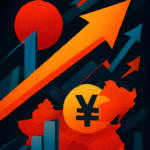Key Points
- Dual-Use Concern: China’s export controls on rare earths are driven by concerns over their dual-use attributes (civilian and military applications), citing national security and non-proliferation obligations.
- Increasing Civilian Demand: The Ministry of Commerce acknowledges the significant and growing global demand for rare earths from civilian sectors like robotics and new energy vehicles (NEVs).
- Compliant Export Process: China states it is reviewing and approving “a certain number of compliant applications” for rare earth exports according to laws and regulations, aiming to meet “reasonable demands.”
- Open to Dialogue: China is willing to strengthen communication with other countries on export controls to facilitate compliant trade.
If you’re in tech, manufacturing, or investment, you’ve likely got China’s rare earth export control playbook on your radar.
It’s a big deal, and understanding the nuances is key.
So, let’s break down the latest from China’s Ministry of Commerce on this critical issue.
Why the Tight Grip? China’s Official Take on Rare Earth Export Measures
First off, many globally are watching China’s moves on rare earth exports closely. Understandably so.
The Ministry of Commerce spokesperson sheds some light on their approach.
The core idea?
Rare earth-related items aren’t just for your new smartphone or EV.
They have significant dual-use attributes – meaning they can be used for both civilian and military purposes.
Because of this, China says implementing export controls on these materials is:
- Standard Practice: It’s “in line with international common practice.”
- Legally Sound: Controls are implemented “in accordance with the law.”
- Purpose-Driven: The main goals are to:
- Better safeguard national security and interests.
- Fulfill international obligations, like non-proliferation.
- Demonstrate China’s consistent position of upholding world peace and regional stability.
The Tech Boom’s Thirst: Civilian Demand for Rare Earths is Skyrocketing
Now, let’s talk about the elephant in the room: the exploding demand for these materials in everyday (and not-so-everyday) tech.
The Ministry acknowledges it.
With industries like robotics and new energy vehicles (NEVs) booming, the global appetite for medium and heavy rare earths in civilian applications is undeniably growing.
This isn’t just a small uptick; it’s a continuous upward trend across many countries.
Balancing Security with Supply: China’s Approach to Export Licenses
So, how does China plan to manage its strategic reserves while acknowledging this global civilian need?
The spokesperson highlighted that China, as a “responsible major country,” is not ignoring these demands.
Here’s their stated process for export license applications for rare earth-related items:
- Consideration First: They “fully consider the reasonable demands and concerns of other countries in civilian applications.”
- Review by the Book: Applications are reviewed “in accordance with laws and regulations.”
- Approvals Happening: Crucially, they “have approved a certain number of compliant applications in accordance with the law.”
- Ongoing Commitment: China “will continue to strengthen the review and approval process for compliant applications.”
The keyword here seems to be “compliant.” What constitutes “compliant” is likely at the heart of many international discussions.
Keeping the Lines Open: Dialogue on Compliant Trade
To address concerns and facilitate smooth (and compliant) trade, China isn’t closing the door on discussions.
The Ministry states a willingness to “further strengthen communication and dialogue with relevant countries on export controls.”
The stated aim? To “facilitate compliant trade.”
This suggests an ongoing effort to define and navigate the rules of engagement for these critical materials.
- Applications are reviewed according to laws and regulations.
- Reasonable demands from other countries for civilian applications are considered.
- A certain number of compliant applications have been approved.
- China plans to continue strengthening the review and approval process for compliant applications.
- Emphasis is placed on “compliant” applications.
Key Takeaways for the Tech Ecosystem in 2025
For founders, investors, and tech leaders, this statement offers a few breadcrumbs:
- Regulated, Not Halted: The message isn’t a full stop on exports, but a continued emphasis on a controlled and regulated system.
- “Compliant” is King: Understanding the criteria for a “compliant application” will be paramount for businesses relying on these resources.
- Dialogue as a Pathway: The openness to discussion could be a channel for industries and nations to clarify needs and processes.
- Strategic Importance Underscored: China continues to view rare earths through a lens of national security and international responsibility, which will always be a factor in their export policies.
The Bottom Line on China’s Rare Earth Export Control Strategy
China’s stance on rare earth export controls remains a delicate balance between safeguarding its national interests, fulfilling international duties, and acknowledging the surging global demand from high-growth civilian sectors like NEVs and robotics.
As of June 2025, the emphasis is on lawful, controlled exports with a door open for dialogue on compliant trade, a critical aspect of navigating China’s rare earth export control landscape.
References
- Official Statements – Ministry of Commerce, PRC
- China tightens grip on rare earth exports with licensing rules – Reuters
- China Restricts More Rare Earth Export Tech in Latest Escalation – Bloomberg
- China tightens export rules on rare earths processing tech, drawing warnings – South China Morning Post





